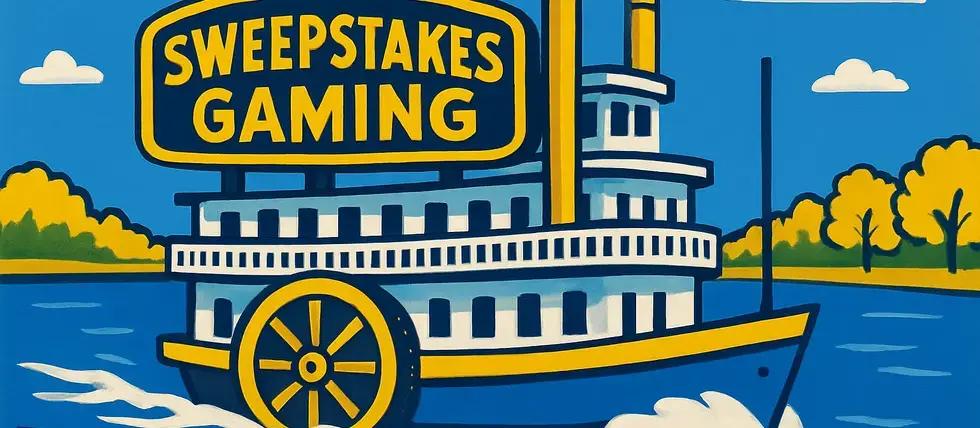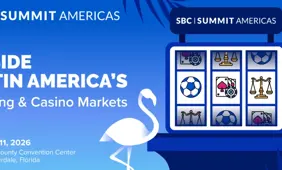Evolution CEO Compares Sweepstakes Casinos to Riverboat Gambling
Evolution’s chief executive has compared U.S. sweepstakes casinos to the country’s old riverboat gambling model.

Evolution’s Strategy and the Sweeps Debate
Martin Carlesund, Chief Executive Officer of Evolution, made the comparison during the company’s third-quarter earnings call, arguing that sweepstakes-style operations occupy a legal gray area similar to that once navigated by riverboat casinos. Carlesund said Evolution will serve sweepstakes operators only where state regulators have not expressly prohibited the activity, and that the vendor would withdraw immediately if authorities issued a ban.
The comments come amid intensifying scrutiny of the U.S. sweepstakes sector. Several major vendors have taken different approaches: Pragmatic Play has withdrawn its titles from sweepstakes platforms nationwide, Booming Games continues to supply some U.S. markets, and Evolution has adopted a state-by-state policy. Evolution’s games are absent from markets such as New York, New Jersey casinos and California, where regulators and lawmakers have moved against certain sweepstakes operators. The company still supplies markets including Iowa and Ohio, where authorities have not taken enforcement action.
Carlesund described sweepstakes as “a very small part” of Evolution’s revenue but said the company believes the channel “has some potential” and that market leadership requires a broad content offering. He referenced a recent Los Angeles interpretation of California law that prompted Evolution to withdraw from that market while regulatory uncertainty remained.
How Sweepstakes Operators Mirror Riverboats
The historical riverboat analogy is instructive. In the 1980s and 1990s, riverboat casinos operated under a narrow set of state-specific rules, some required actual cruising or limited hours and betting caps. Over time many of those restrictions eased; today several riverboat-branded casinos remain permanently moored yet continue to operate under laws that originally permitted them because they were technically on navigable waters.
Sweepstakes casinos similarly rely on statutory and regulatory interpretations to operate. They typically use a two-currency model: a recreational in-game token that has no cash value and a secondary “sweeps” token that can be redeemed for real currency. Operators argue this structure complies with state sweepstakes laws because sweeps tokens can be obtained without purchase and participation is technically optional. Regulators and prosecutors counter that the mechanics can replicate real-money gambling.
That tension underpins ongoing litigation in California, where state prosecutors have sued operators and some suppliers for allegedly offering illegal gambling. The case targets multiple firms named in court filings and could set a precedent for how states treat virtual sweepstakes engines and the soft-currency model.
An industry consultant who asked to remain anonymous said: “Like riverboats, sweepstakes platforms exploit narrow statutory exceptions and varying enforcement priorities. Vendors are making a calculated bet that, absent a clear legal ban, the economic upside outweighs the regulatory risk but a major adverse court ruling or a coordinated set of state actions could collapse that market overnight.”
Legal observers note the practical difference between state and federal action. State attorneys general and city prosecutors have been the most active enforcers, issuing cease-and-desist letters and filing suits, while federal authorities have so far been less engaged. That fragmented enforcement creates an uneven landscape for vendors, platforms and players.
More Business News
Regulatory Hot Spots And What Comes Next
California’s lawsuit is the immediate focal point; its outcome may influence other states considering bans or targeted enforcement. New York has already issued cease-and-desist letters in several cases, and other jurisdictions such as Texas and Florida Gaming Control Commission are evaluating whether existing consumer-protection and anti-gambling statutes apply to sweepstakes models.
For vendors, the near-term play is clear: follow state guidance, engage regulators proactively, and maintain the ability to withdraw quickly from markets that become legally hostile. For regulators and lawmakers, the choice is between clarifying statute language, pursuing enforcement actions that would narrow the sweepstakes model’s reach, or allowing the market to continue evolving under local interpretations.
Whatever unfolds, the riverboat comparison underlines a familiar industry pattern: when commercial opportunity meets patchwork regulation, suppliers and operators will test the boundaries until lawmakers or courts set firmer limits.
RELATED TOPICS: Business
Most Read
Mississippi Committee Advances Bill to Criminalize Online Sweepstakes Casinos
Jan 29, 2026Giuseppe Iadisernia Wins Seminole Hard Rock Lucky Hearts Poker Open Championship
Jan 28, 2026Must Read
 Interviews
Interviews
Exclusive Interview: Levon Nikoghosyan Shares AffPapa Winning Formula for Successful iGaming Events
Dec 03, 2025 Interviews
Interviews









Review this New Post
Leave a Comment
User Comments
Comments for Evolution CEO Compares Sweepstakes Casinos to Riverboat Gambling